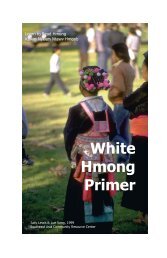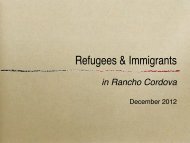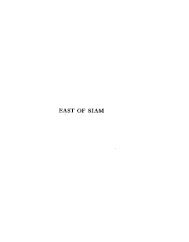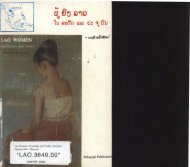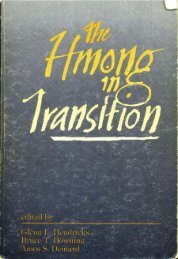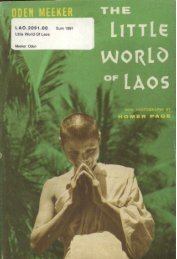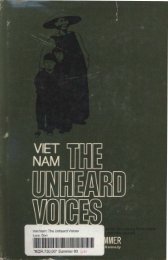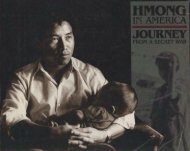PEOPLE
Grant, The Boat People - Refugee Educators' Network
Grant, The Boat People - Refugee Educators' Network
- No tags were found...
You also want an ePaper? Increase the reach of your titles
YUMPU automatically turns print PDFs into web optimized ePapers that Google loves.
my house by waking the streets and seeing a board 'For rent'. For<br />
months I mdicd Engli~h at night and lmkcd for a job, and now I work in :<br />
a mercantile re-inrmrance company. My pay is $8700 a year. I think this ia<br />
1<br />
enough for my family which is small now.<br />
The cold, he said, was bothersome, as was thr language Nnier<br />
But his main problem was his work:<br />
I am a builder, not an insurance worker. 1 spcnt many yeam in univenity<br />
laming my business, but here I have not the qualifications. I would hrvc<br />
to take an examination in Toronto, but my English is not good enough and .<br />
it's not possible to learn quickly when I have ta work ewry day.<br />
Mr Nguycn said he was aware of some resentment towards the<br />
refugees, but ht had not encountered it personally.<br />
The people at work, they seem to like me very much; I have rcccivcd mcrcy<br />
from them. I think that I love the Canadians very much, Bur I am not happy,<br />
How can I he? I always miss my family, 1 think 111 the timc of Viemam, Canada<br />
is my country for a time. Rut I will go back immcdiatcly if Viemam has<br />
another revolution, I will not want to stay here then.<br />
It is still early duys for Canada. If the country ends up accepting<br />
the full 50 000 to which it is committed, this would represent the<br />
largest movement of refugecs to Canada since the cnd of the second<br />
world war. An opinion poll taken in July 1979, iust beforc the quom<br />
was boosted, showed that, n~tiondly, about 50 per cent of Canadian<br />
adults favoured the admission of more refugees from South-Ea*<br />
Asia, while 38 per cent disapproved. By cuntrast, a poll taken five<br />
months earlier had indicxted that 52 per cent of adults felt that too<br />
many refugcr~ wcre bcing admitted - and the figure at char timc was<br />
a meagre 5000 a year. Which is thc real opinion?<br />
Lrn ited Kingdorn<br />
Although - -- --. w<br />
Britain was co-chairman with thc Soviet Union of the<br />
Geneva agreements and, before that, played a role in occupying<br />
st~uthern Vstnam aftcr the second world war, it was not directly<br />
involved thcre as a colonial power and was not a military ally of rht<br />
United States during the Vietnam war. The sense of guilt and<br />
rcsponsibility that Rritain feels about many of in former colonies<br />
therefore does not extend to Vietnam. The relief, now that Vietnam<br />
has become an international issue again, is shared by politicians from<br />
all parties and tht British people in general.<br />
Prime Minister Margaret Thatcher stlid what many voters wanted<br />
to hear before the elections in May 1979: her government would<br />
introduce strict controls on immigration because many Britons felt<br />
they were being swamped by 'alien culture'. She drew loud protests<br />
from human rights and race relatiuns organizations, but observers<br />
believe her stance contributed to her election victory. Mrs Thatcher<br />
was later asked if she had modified her attitude: she was adamant<br />
that she had not.<br />
Some people have felt swamped by immigrants. They've acen rht whole<br />
character of heir ncighbollihd change. I st& by tha ntutcmcnt 100 p r<br />
ccnt and continue to stand by it. Of course . . . wme minorities can be<br />
absorkd - they can bc assem to the majority of the community - bur once<br />
a minority in a ncighbwrhd gets very large, people do feel swamptd. They<br />
feel their whole way of life has been changed,<br />
Against this background, the Indo-Chinese refugee crisis reached<br />
its climax, Mrs Thatcher at first stuck firmly to her election strategy<br />
of restricting 'black' immigration. (All Asians, Afro-Caribbtans and<br />
other non-whites are officially 'black' in British statistics.) She<br />
relented only after the foreign secretary, Lord Carrington, toured<br />
the refugee centres of Hong Kong and South-East Asia and exprcsscd<br />
his concern at the tragedy of thc boat people. Urged by him<br />
and the UN secretary-general, Kurt Waldheim, Mrs Thatcher<br />
moved from opposing any significant intake of refugees to a commitment<br />
to resettle 10 000 - all from the British territory of Hong Kong.<br />
Refore hat commitment, the I.ahur government had agreed to<br />
settle 1500 from South-East Asian camps. Another 1033 have ken<br />
accepted on humanitarian grounds, many of hem rescued by British<br />
ships.<br />
The British press has been more enthusiastic about accepting<br />
refugees than have the British politicians or the British people.<br />
hspite opposition to entry of Indo-Chinese refugees expressed in<br />
the letters columns of the daily newspapers, editorialists and columnists<br />
responded positively, arguing that the boat people especially<br />
should be allowed in to Britain. The Guardian said: 'Mrs Thatcher's




